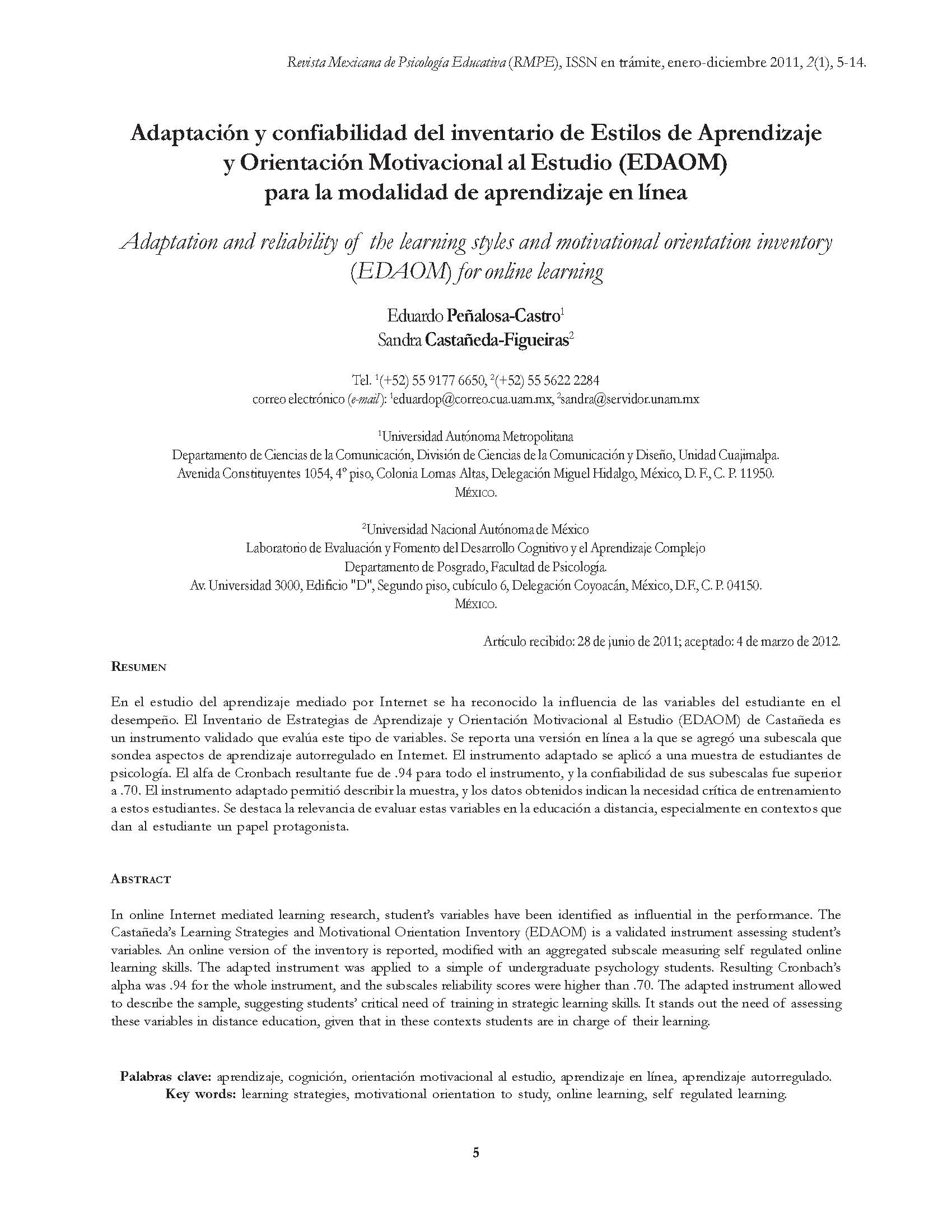Abstract
In online Internet mediated learning research, student’s variables have been identified as influential in the performance. The Castañeda’s Learning Strategies and Motivational Orientation Inventory (EDAOM) is a validated instrument assessing student’s variables. An online version of the inventory is reported, modified with an aggregated subscale measuring self regulated online learning skills. The adapted instrument was applied to a simple of undergraduate psychology students. Resulting Cronbach’s alpha was .94 for the whole instrument, and the subscales reliability scores were higher than .70. The adapted instrument allowed to describe the sample, suggesting students’ critical need of training in strategic learning skills. It stands out the need of assessing these variables in distance education, given that in these contexts students are in charge of their learning.
References
Azevedo, R. y Cromley, J.G. (2004). Does training on self regulated learning facilitate students' learning with hypermedia? Journal of Educational Psychology, 96, 523-535. Carroll, C. A. y Garavalia, L.S. (2002). Gender and racial differences in select determinants of student success. American Journal
of Pharmaceutical Education, 66, 382-387.
Castañeda, S. y López, M. (1989). Antología. La psicología cognoscitiva del aprendizaje: Aprendiendo a aprender. México,
UNAM.
Castañeda, S. y Ortega, I. (2004). Evaluación de estrategias de aprendizaje y orientación motivacional al estudio. En S. Castañeda (Ed). Educación, aprendizaje y cognición: teoría en la práctica. México, Manual Moderno, pp. 277-299.
DeBord, K. A.; Aruguete, M.S., Y Muhlig, J. (2004). Are computer-assisted teaching methods effective? Teaching of Psychology, 27(4), 65-68.
Dembo, M. H., Junge, L., y Lynch, R. (2006). Becoming a self-regulated learner: Implications for Web-based education. En H. F. O'Neil, y S. R. Perez (Eds.), Web- based learning: Theory, research, and practice (pp. 185-202). Mahwah, NJ: Erlbaum.
Glaser, R. (1996). Changing the agency for learning: Acquiring expert performance. En K. A. Ericsson (Ed). The road to excellence: The acquisition of expert performance in the arts and sciences, sports and games (pp. 303-311). Hillsdale, NJ: Lawrence Erlbaum.
Glaser, R., y Baxter, G.P. (2000) Assessing active knowledge. CRESST, University of Pittsburgh. http://www. cse.ucla.edu/CRESST/Reports/TECH516.PDF
Kinney, N. (2001) A guide to design in testing in online psychology courses. Psychology Learning and Teaching, 1, 16-20.
Körndle, H., Narciss, S., y Proske, A. (2002). Promoting self- regulated learning in web-based learning environments. En:
H. Niegemann, R. Brucken y D. Leutner (Eds.), Instructional design for multimedia learning. Munster: Waxmann.
Ley, K. (2004). Motivating the distant learner to be a self-directed learner. 20th Annual Conference on Distance Learning and Teaching, Universidad de Wisconsin, EUA.
Ley, K., y Young, D.B. (2001). Instructional principles of self regulation. Educational Technology Reserarch & Development, 49, 93-103.
Lynch, R., y Dembo, M. (2004) The Relationship Between Self- Regulation and Online Learning in a Blended Learning Context. Recuperadode: http://www.irrodl.org/content/v5.2/ lynch-dembo.html
Maki, M. R. H., y Maki, W. S. (2000b). Evaluation of web- based introductory psychology course: II. Contingency management to increase use of on-line study aids. Behavior, Research Methods, Instruments and Computers, 32(2), 230-239. Maki, M. R. H. y Maki, W. S. (2000a). Mastery quizzes on the Web: results form a Web-based introductory psychology course. Behavior, Research Methods, Instruments and Computers,
( 2), 212-216.
Maki, M. R. H., Maki, W. S., Patterson, M., y Whittaker, P. D. (2000). Evaluation of web-based introductory psychology course: I. Learning and satisfaction in on-line versus lecture courses. Behavior, Research Methods, Instruments and Computers, 32, 230-239.
Peñalosa, E., y Castañeda, S. (2007). Meta-Tutor: construcción, descripción y aplicación de un ambiente de aprendizaje para Internet, Revista Latinoamericana de Tecnología Educativa,
(1), 97-127. Recuperado de http://campusvirtual. unex.es/cala/editio/
Peñalosa, E., y Castañeda, S. (2008a). Generación de conocimiento en la educación en línea: un modelo para el fomento de aprendizaje activo y autorregulado, Revista Mexicana de Investigación Educativa, 13(36), 229-260.
Peñalosa, E., y Castañeda, S. (2008b). Meta-Tutor: an online environment for knowledge construction and self- regulated learning in clinical psychology teaching. International Journal of Continuing Education, Engineering and Lifelong Learning, 18(3), 283-297.
Pintrich, P. R. (2000). The role of goal orientation in self- regulated learning. En: M. Bokaerts, P. Pintrich y M. Zeidner (Eds.), Handbook of self-regulation. San Diego, Academic Press, 451-502.
Pintrich, P. R. ,y De Groot, E. V. (1990). Motivational and self- regulated learning components of classroom academic performance. Journal of Educational Psychology, 33-40.
Pintrich, P. R., Smith, D. A., García, T., y McKeachie, W.J. (1991). Reliability and Predictive Validity of the Motivated Strategies for Learning Questionnaire (MSLQ), Educational and Psychological Measurement, 53, 801-813.
Poirier, C. R., y Feldman, R. S. (2004). Teaching in cyberspace: online versus traditional instruction using a waiting-list experimental design. Teaching of Psychology, 31(1), 59-62. Torrano, F. y Gonzalez, M.C. (2004). El aprendizaje autorregulado: presente y futuro de la investigación. Revista electrónica de investigación psicoeducativa, 3(2), Recuperado
de: http://www.investigacion-psicopedagogica.org/ revista/articulos/3/espannol/Art_3_27.pdf
Waschull, S. B. (2001). The online delivery of psychology courses: attrition, performance, and evaluation. Teaching of Psychology, 28(2), 143-147.
Weinstein, C. E., Powdrill, L., Husman, J., Roska, L. A., y Dierking, D. (1998). Aprendizaje estratégico: un modelo conceptual, instruccional y de evaluación, en: S. Castañeda (Ed). Evaluación y fomento del desarrollo intelectual en la enseñanza de ciencias, artes y técnicas (pp. 197-228). México, UNAM-Conacyt-Porrúa.
Winne, P. H., y Perry, N. E. (2000). Measuring self-regulated learning. En: M. Noekaerts, P. Pintrich y M. Zeidner (eds): Handbook of self-regulation, pp. 531-566. San Diego, Ca., Academic Press.

This work is licensed under a Creative Commons Attribution-NonCommercial-NoDerivatives 4.0 International License.
Copyright (c) 2024 Universidad Nacional Autónoma de México


